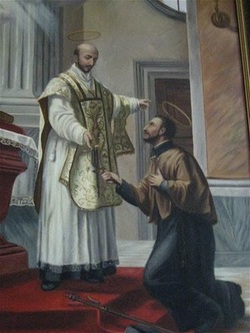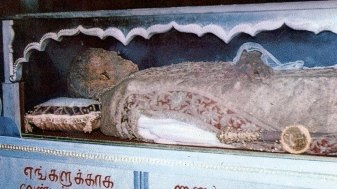
The hardness and holiness of his life had made him meet to be called to be an Apostle, and when John III, King of Portugal, asked Pope Paul III to send to the Indies some members of the then new Society of Jesus, the Pontiff, by the advice of St. Ignatius, sent Francis to enter on that vast field of labour with the powers of Apostolic Nuncio. When he began his work, it seemed as though God himself taught him the many and difficult languages of the natives. It even happened that when he preached in one language to a mixed congregation of different nationalities, each one heard him in his own tongue wherein he was born. He travelled over countless districts, always walking, and often bare-footed. He introduced the faith into Japan, and six other countries. In India he turned many hundred thousands to Christ, and regenerated many chiefs and kings in the holy font. And notwithstanding that he was doing all these great things for God's service, so deep was his lowliness that when he wrote to St. Ignatius, the General of the Society, he did so on his knees.
God was pleased to support his zeal for spreading the Gospel with many and great miracles. He gave sight to a blind man. On one occasion the supply of fresh water failed when he was at sea, and five hundred sailors were in danger of perishing by thirst, but the servant of God, by the sign of the Cross, turned salt water into fresh, and they used it for a considerable time. Some of this water was also carried into different countries, and a great number of sick persons were instantaneously cured by it. He called several dead men to life, among whom was one who had been buried the day before, and who was disinterred by command of the saint; and likewise two others who were being carried to the grave, and whom he took by the hand restored living to their parents. He had the spirit of prophecy, and foretold many things, remote both in place and time. Utterly worn out with his labours, he died full of good works in the island of Sanchan in the Canton River. His body was buried in quick lime, and, being again taken up, was again buried in the same, but at the end of many months it was found entirely incorrupt, and sweet, and, when cut, blood flowed freely from it. From China it was carried to Malacca, and, as soon as it reached that place, a plague, which was raging there, ceased. At length, when he had become famous throughout the whole world for new and wonderful miracles, Gregory XV added his name to the list of the Saints. And Pius X chose and appointed him as heavenly patron of the association and work of the Propagation of the Faith.





